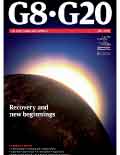

 |
 |
|

The G20, the International Monetary Fund and global surveillance
By Domenico Lombardi, president, The Oxford Institute for Economic Policy, non-resident senior fellow, Brookings Institution
To download a low-resolution pdf, click here or go to the Newsdesk site.
Through its surveillance framework, the IMF aims to achieve strong, sustainable and balanced global growth
At the G20 Toronto Summit, for the first time leaders will mutually assess their economic policies on the basis of the Framework for Strong, Sustainable and Balanced Growth, proposed by the United States at the Pittsburgh Summit in September 2009. Through this framework, leaders pledged to devise a method for setting objectives, to develop policies to support such objectives and to assess outcomes through mutual evaluation. The involvement of the International Monetary Fund (IMF) has been sought in providing analysis on various national and regional policy frameworks and how they fit together. The end goal is “strong, sustainable and balanced growth” in which the improvement of living standards in emerging markets and developing countries is meant to be a critical element.
On the basis of country submissions, the IMF has been asked to point out inconsistencies and incoherence in national assumptions, to evaluate the mutual compatibility of different country frameworks and policies, and to determine the aggregate effects of various national frameworks and policies on the global economy. After the initial phase of the mutual assessment process, which culminates with the June 2010 Toronto Summit, using data provided by the IMF, the G20 will devise a set of specific mutual assessment and policy recommendations that take into account not only policy implementation but follow-ups as well. Once the entire framework process is completed, in November 2010, following the Seoul Summit, it could then be fully implemented on an annual basis.
This exercise represents the first instance of multilateral surveillance on a global scale in recent history. It is characterised by two main innovations. To start, this is the first time the US has agreed – even proposed – to submit itself to a structured, full peer review process. In the case of the Jamaica Amendment, when the current IMF surveillance framework was discussed and approved in 1978, the US only reluctantly accepted its basic premise. The second novelty this time is the distinct shift from the previous practice whereby multilateral surveillance of the global economy was, in effect, handled within the closed circle of the G7.
Different from the narrow G7 membership (that is, the G8 without Russia), the G20 includes all the systemically important countries, such as the largest emerging Asian economies of China and India, as well as Korea and Japan.
This expanded membership gives Asian countries an immediate and alternative platform for engaging with the IMF, which these countries still see as dominated by Europe and North America. The G20 was chosen, in fact, to integrate rising powers, mainly from Asia, into the multilateral system.
The G20-led multilateral surveillance poses some important challenges, however. One is that the exercise appears to be geared mainly toward raising awareness among national policymakers of the international spillover effects of their policies and providing a context in which they can exercise pressure. Whether this will bring about substantial revisions to national frameworks is uncertain, as it presupposes a common vision of the costs and benefits from coordination. Countries may have to change their policy stance in order to preserve the overall stability of the global economy, to accept higher risks by revisiting their precautionary reserve accumulation policy, or to revise their exchange rate policies.
G20 countries have so far all committed to a peer review process for their economic policies and to a broadly defined policy objective. This pledge does not mean that they have committed to numerical policy targets – consistent with quantitatively defined objectives set for the overall group – for which they can be held accountable in a multilateral forum. This situation is reminiscent of early IMF attempts, in the 1970s, to get systemically important economies to commit to a multilateral surveillance framework. Ultimately, these countries distanced themselves from specific commitments. IMF multilateral surveillance became simply a forum for exchanging views and information on each other’s economic policies.
An additional challenge refers to the IMF itself and to its role in the G20-led process. Like the G7, the IMF continues to enjoy an advisory function. Unlike with the G7, however, its advisory role is more clearly spelled out and, given the greater number of G20 member economies, is much more strategic. Still, it is not clear what an advisory role of this sort means for discharging critical tasks from its own mandate. The proposal from the US to grant the G20, and not the IMF, authority over the issue of China’s exchange rate is a case in point.
In keeping with recent tradition, the IMF’s executive board plays no part in formulating the organisation’s advice to the G20. While it is true that many members of the G20 also sit on the board of the IMF and thus their involvement is guaranteed through their respective capitals, most of the executive directors do not just represent their nominating countries alone, but rather represent a group of countries. This added responsibility confers much greater legitimacy to each decision of the IMF’s policy-making body.
Clearly, the dualism between the IMF and the G20 would disappear if the latter were to become a formal decision-making ministerial body within the IMF itself. This arrangement would have two distinct advantages: it would increase the legitimacy of the G20, as each member of the ministerial committee would also represent a number of other countries based on the constituency system that underpins IMF governance. And it would reassert the centrality of the IMF’s role as overseer of the international monetary system, thereby providing the institution with unprecedented political impetus.
This proposal has been put forward by a number of authoritative figures, including Tim Adams, former under secretary of the US Treasury, and Mervyn King, governor of the Bank of England. The Fourth Pillar Report, submitted to the IMF managing director in 2009 by a group of civil society organisations, has outlined a number of preconditions for such a reform to be feasible, including realigning voting power within the IMF membership, reconfiguring the composition of the executive board and establishing board constituencies with some basic accountability mechanisms that are currently completely absent.
|
This Information System is provided by the University of Toronto Library |
All contents copyright © 2024. University of Toronto unless otherwise stated. All rights reserved.